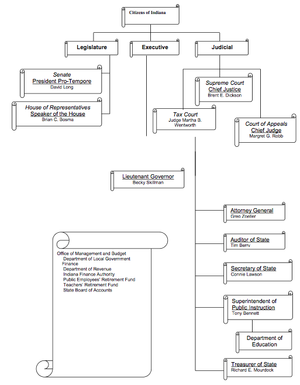Indiana Utility Regulatory Commission
| Indiana Utility Regulation Commission | |
 | |
| General information | |
| Office Type: | Nonpartisan |
| Office website: | Official Link |
| Compensation: | $158,664 |
| 2025 FY Budget: | $13,449,298 |
| Total Seats: | 5 |
| Term limits: | None |
| Structure | |
| Length of term: | 4 years |
| Authority: | Indiana Code, Title 8, Article 1, Chapter 1 |
| Leadership: | James Huston |
| Selection Method: | Appointed by the governor |
| Other Indiana Executive Offices | |
| Governor • Lieutenant Governor • Secretary of State • Attorney General • Treasurer • Comptroller • Examiner • Secretary of Education • Agriculture Director • Insurance Commissioner • Natural Resources Director • Labor Commissioner • Utility Regulatory Commission | |
The Indiana Utility Regulatory Commission is a five member board in the Indiana state government. The commission works toward ensuring that safe and reliable utilities are provided to citizens of Indiana at a reasonable cost. The Indiana Utility Regulatory Commission was originally established in the late 1800s as the Railroad Commission. By 1913, the agency was re-named the Public Service Commission, and was given regulatory responsibility over natural gas, water, private sewer, electric and telephone services. In 1987, the General Assembly changed the name of the commission to its current title.[1]
Current officeholder
The current chairman is James Huston. The current officeholders are:
- Wesley Bennett (nonpartisan)
- Sarah Freeman (nonpartisan)
- James Huston (nonpartisan)
- David Veleta (nonpartisan)
- David Ziegner (nonpartisan)
Authority
Title 8, Article 1, Chapter 1 of the Indiana Code addresses the utility regulatory commission:[2]
|
There is created the Indiana utility regulatory commission which shall consist of five (5) members... |
Qualifications
One member must be an attorney qualified to practice law in Indiana and no more than three can be of the same political party.[2]
|
...at least one (1) of whom shall be an attorney qualified to practice law before the supreme court of Indiana and not more than three (3) of whom belong to the same political party. |
Appointments
The commissioners are appointed by the governor to four-year terms.[2]
|
The members of the commission and all vacancies occurring therein shall be appointed by the governor from among persons nominated by the nominating committee in accordance with the provisions of IC 8-1-1.5. The members may be removed at any time by the governor for cause. The governor shall appoint one (1) member as chairman. The members of the commission shall be appointed for a term of four (4) years, except when a member is appointed to fill a vacancy, in which case such appointment shall be for such unexpired term only. |
Vacancies
Note: Ballotpedia's state executive officials project researches the constitutional or statutory text that details the process of filling vacancies for a state executive office. That information for the Indiana Utility Regulatory Commission has not yet been added. After extensive research, we were unable to identify any relevant information on state official websites. If you have any additional information about this office for inclusion on this section and/or page, please email us.
Duties
The commission acts as an impartial fact-finding body with respect to the public and the utility companies. They rule in cases that are presented to them, taking into account Indiana state regulations.[2]
Divisions
As of January 21, 2021, there are two main divisions in the Indiana Utility Regulatory Commission: Technical and Legal.[3]
State budget
- See also: Indiana state budget and finances
The Utility Regulatory Commission's budget was $13,449,298 for Fiscal Year 2025.[4]
Compensation
- See also: Compensation of state executive officers
2023
In 2023, each commissioner received a salary of $158,664, according to the Council of State Governments.[5]
2022
In 2022, each commissioner received a salary of $146,911, according to the Council of State Governments.[6]
2021
In 2021, each commissioner received a salary of $142,028, according to the Council of State Governments.[7]
2020
In 2020, each commissioner received a salary of $137,891, according to the Council of State Governments.[8]
2019
In 2019, each commissioner received a salary of $127,500, according to the Council of State Governments.[9]
2018
In 2018, each commissioner received a salary of $127,500, according to the Council of State Governments.[10]
2017
In 2017, each commissioner received a salary of $142,140, according to the Council of State Governments.[11]
2016
In 2016, each commissioner received a salary of $120,716, according to the Council of State Governments.[12]
2015
In 2015, each commissioner received a salary of $114,902, according to the Council of State Governments.[13]
2014
In 2014, the commissioners each received a salary of $114,902, according to the Council of State Governments.[14]
2013
In 2013, the commissioners each received a salary of $111,448, according to the Council of State Governments.[15]
2012
In 2012, the commissioners each received a salary of $109,262, according to the Council of State Governments.
Historical officeholders
Note: Ballotpedia's state executive officials project researches state official websites for chronological lists of historical officeholders; information for the Indiana Utility Regulatory Commission has not yet been added because the information was unavailable on the relevant state official websites, or we are currently in the process of formatting the list for this office. If you have any additional information about this office for inclusion on this section and/or page, please email us.
Contact information
Indiana Utility Regulatory Commission
101 West Washington Street
Suite 1500 E
Indianapolis, Indiana 46204
Phone: (317) 232-2701
Agency Fax: (317) 232-6758
Consumers Affairs Fax: (317) 233-2410
Recent news
The link below is to the most recent stories in a Google news search for the terms Indiana Utility Regulatory Commission. These results are automatically generated from Google. Ballotpedia does not curate or endorse these articles.
See also
External links
Footnotes
- ↑ Indiana Utility Regulatory Commission, "About the IURC," accessed January 21, 2021
- ↑ 2.0 2.1 2.2 2.3 Indiana Code, "IC 8-1-1," accessed January 21, 2021
- ↑ Indiana Utility Regulatory Commission, "About the IURC," accessed January 21, 2021
- ↑ Indiana State Budget Agency, "2023-2025 The Whole Budget Report," accessed December 6, 2023
- ↑ Council of State Governments, "Book of the States 2023 Table 4.11: Selected State Administrative Officials: Annual Salaries," accessed January 15, 2025
- ↑ Council of State Governments, "Book of the States 2022 Table 4.11: Selected State Administrative Officials: Annual Salaries," provided to Ballotpedia by CSG personnel
- ↑ Issuu, "The Book of the States 2021," accessed September 22, 2022
- ↑ Council of State Governments, "Selected State Administrative Officials: Annual Salaries, 2020," accessed January 21, 2021
- ↑ Council of State Governments, "Selected State Administrative Officials: Annual Salaries, 2019," accessed January 21, 2021
- ↑ Council of State Governments, "Selected State Administrative Officials: Annual Salaries, 2018," accessed January 21, 2021
- ↑ Council of State Governments, "Selected State Administrative Officials: Annual Salaries, 2017," accessed January 21, 2021
- ↑ Council of State Governments, "Selected State Administrative Officials: Annual Salaries, 2016," accessed August 27, 2016
- ↑ Council of State Governments, "Selected State Administrative Officials: Annual Salaries, 2015," accessed August 27, 2016
- ↑ Council of State Governments, "Selected State Administrative Officials: Annual Salaries," accessed November 14, 2014
- ↑ The Council of State Governments, "Book of the States 2013, Table 4.11," accessed February 2, 2014
| |||||||||||||||||
| ||||||||||||||||
 |
State of Indiana Indianapolis (capital) |
|---|---|
| Elections |
What's on my ballot? | Elections in 2025 | How to vote | How to run for office | Ballot measures |
| Government |
Who represents me? | U.S. President | U.S. Congress | Federal courts | State executives | State legislature | State and local courts | Counties | Cities | School districts | Public policy |

